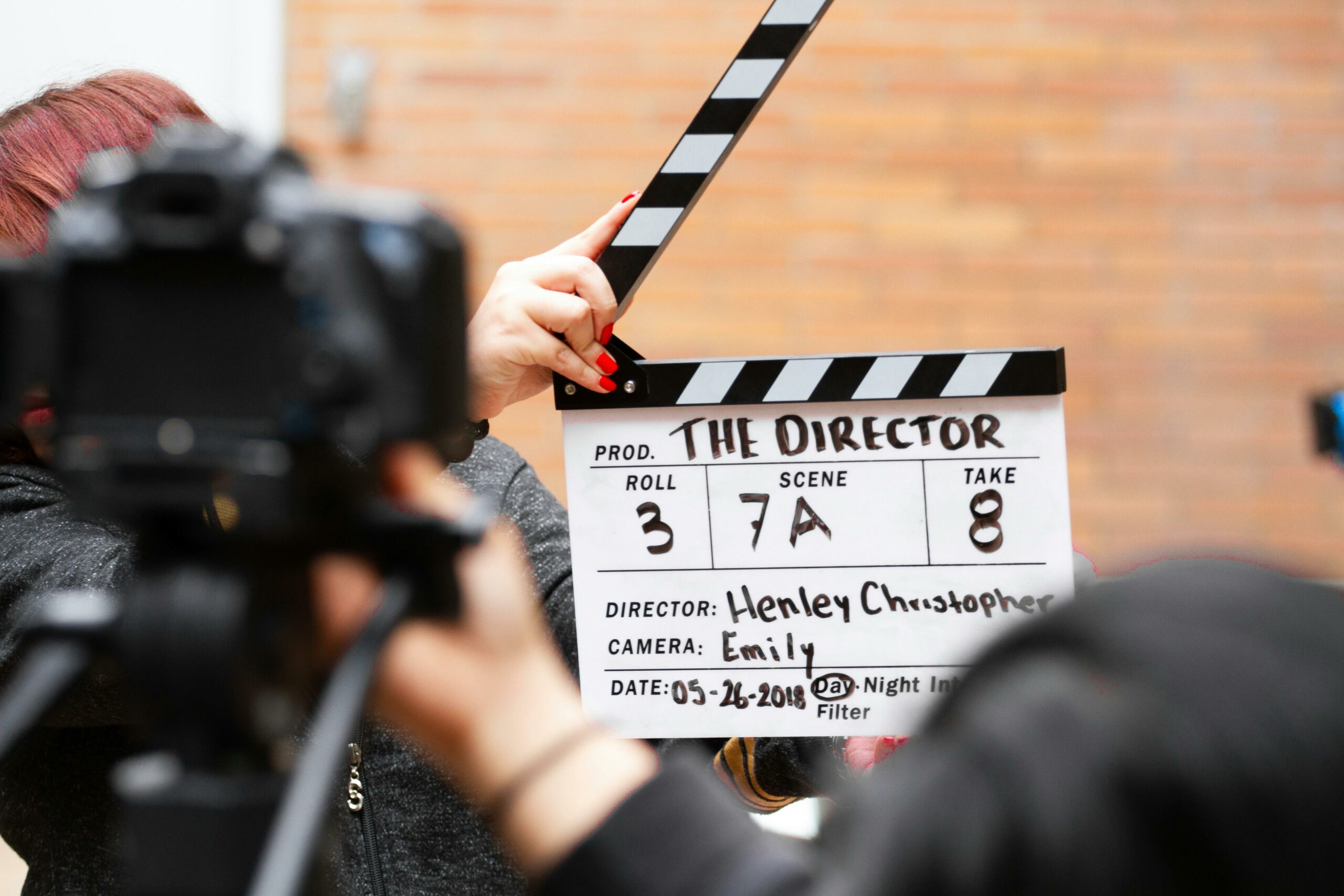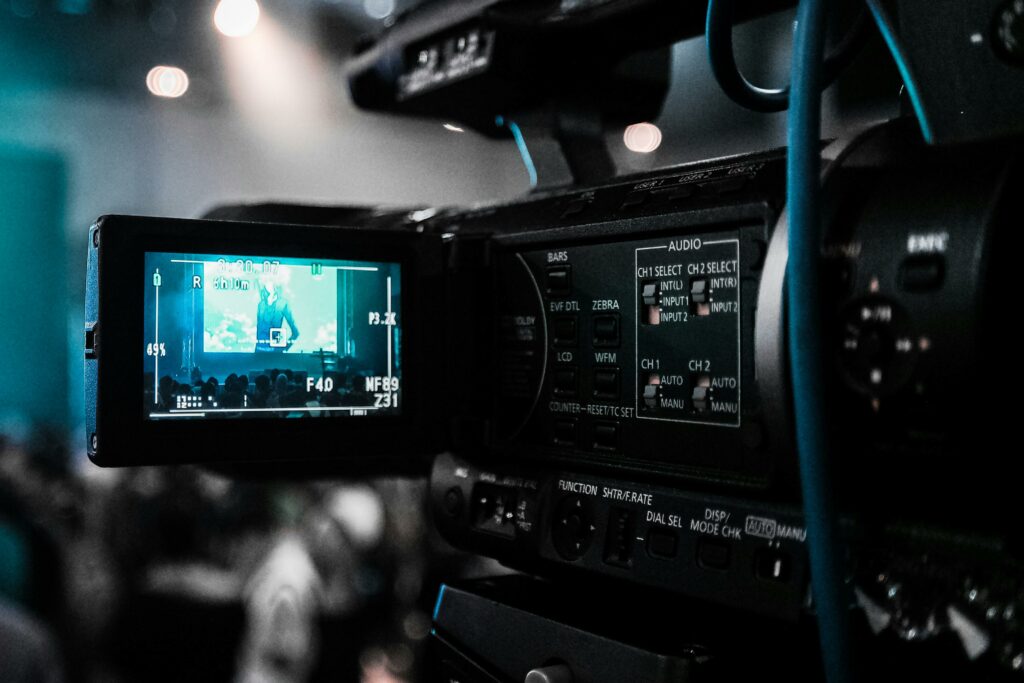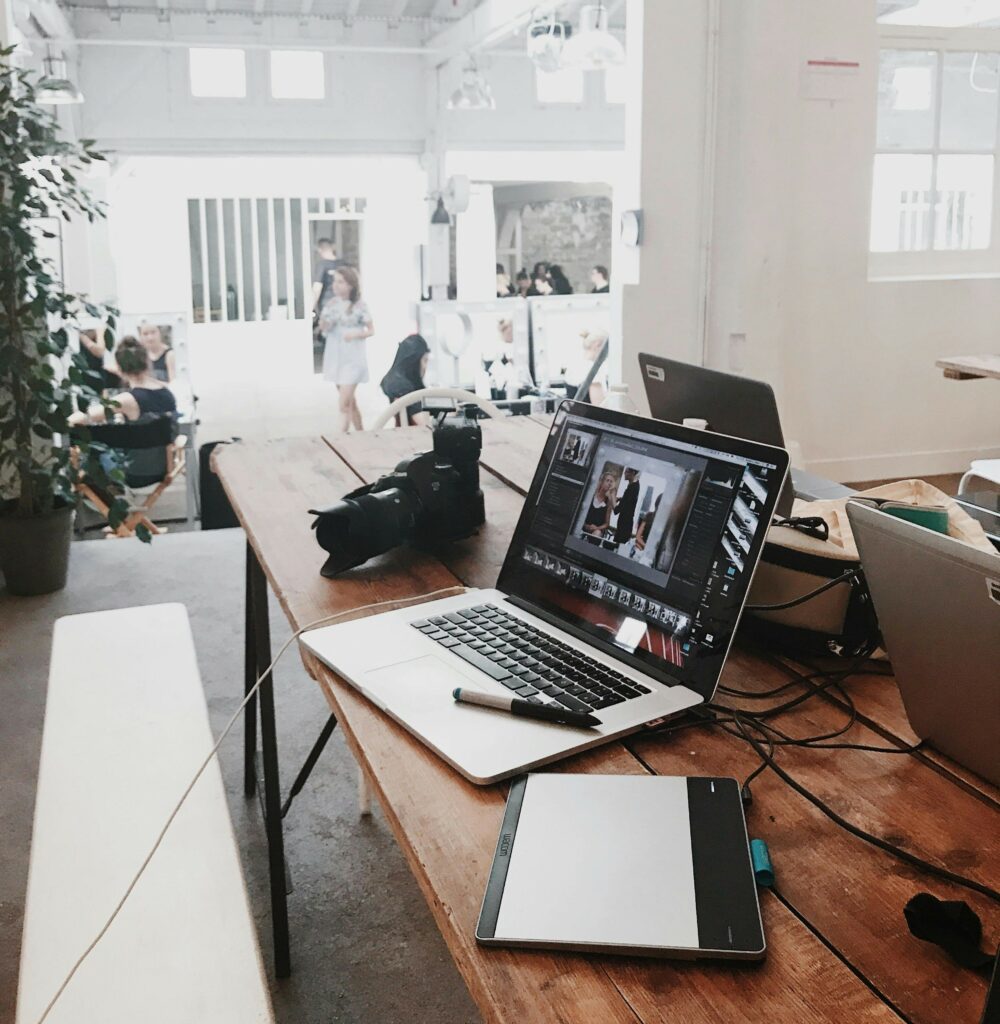Elliot’s Article
IT'S YOUR PROBLEM NOW, KIDS!

Are You Not EntertAIned?
Artificial Intelligence and the Future of Entertainment
Photo by Martin Lopez courtesy of Pexels
Unless you’ve been living under a rock for the last few years, you have more than likely heard at least one person in your life talking about AI recently. Since ChatGPT launched in November 2022, discussion surrounding AI has been inescapable pretty much wherever you go. In the classroom, university professors and high school teachers alike warn students that using AI to help with an assignment will result in a failing grade. In big cities, companies like Uber are starting to face competition from driverless rideshare companies like Waymo, and online, platforms like the one formerly known as Twitter (I’m not calling it X) are especially full of AI discourse. Sometimes it feels like every other tweet is an AI bro with an NFT profile picture talking about how AI is the future of everything. All these people think about is how generative AI is going to revolutionize art, and how awesome the future is going to be when artists don’t have to work anymore. It’s just unfortunate because the future these people want might actually come to pass if we continue to let AI evolve without regulating its use. The only consolation is that sometimes these people get owned and it’s really funny. Like when an AI bro named Oscar Bartolomé used AI to create fanart of Luffy, the protagonist of One Piece. When someone criticized his “work,” he responded by saying that “not even in your dreams would you be able to make an illustration like this.” Ironically, his critic would take this opportunity to reveal themselves as an actual animator on One Piece. Following this exchange, Bartolomé deleted all his tweets on the subject. So with AI being all over social media and advancing as rapidly as it is, it should come as no surprise that big companies are all wanting their piece of the AI pie; and the entertainment industry is no exception. AI is still a long way away from being able to fully generate an entire feature film, but it is still having its effects on the industry. At first, the AI was only being used for minor cost-saving measures, but even those can become problematic. With AI beginning to threaten the jobs of actors, visual effect artists, and writers, the future of entertainment isn’t looking the brightest.
When filming Creed III in February 2022, the film’s visual effects team scanned the likenesses and actions of 200 background actors. The actors were told it was to help “fill crowd scenes,” and using the scans VFX artists were able to turn the 200 real actors into thousands. At the time, none of the actors on set thought anything of this, but now that studios are showing interest in reaplacing background actors with AI generated people, many background actors are starting to speak up. Alexandria Rubalcaba worked as a background actor for WandaVision during the pandemic and was one of dozens of actors to have their likenesses scanned and turned into Disney-owned digital avatars. Rubalcaba says that she was “never told how or if this digital avatar of herself would ever be used” and that if it ever was, she would never be paid for it. And that, of course, is not good. The entertainment industry already has issues with paying its workers fairly, particularly those in visual effects, so the idea that AI could soon take the jobs of every background actor is quite problematic. Background actors help populate worlds and make them feel real. If every alien in Star Wars was generated by AI, the galaxy far far away would not feel as lived-in as it does. Stories like this are becoming more common by the day and it does not bode well for the future of background actors. But this is just one way AI is impacting the people that work in entertainment. The bigger and better AI becomes the more and more these companies want to use it, and now we’re starting to see some enormous companies chose to spend millions of dollars on AI generated slop in lieu of paying for actual human labor.

One example of this would be the recent actions of corporate juggernaut Coca Cola. Obviously Coca Cola isn’t in the entertainment business, but they are conducting an experiment with AI at the moment that could have disastrous consequences for the future of visual effects. Every year, as the Christmas season approaches the company responsible for popularizing our modern interpretation of Santa Claus launches a new line of seasonal advertisements. This year, the marketing geniuses that convinced us polar bears like soft drinks decided the thing to do was to pay homage to an ad from the 90s’ called “holidays are coming” using not one, but three different AI studios. As I’m sure you could guess, the reactions to this ad were less than positive, and it did not take long for people on the platform formerly known as Twitter to comb through the ad and find details that are just wrong. From truck wheels that glide instead of rolling to distorted proportions, everything about the ad screams generative AI. Even the onscreen text feels soulless, as the ad itself has disclosed that the images are entirely AI generated via small text in the bottom corner. Of course a couple 30 second ads are far from an entire movie and they aren’t going to cause the end of the world, but these ads represent a dangerous possibility for the future. If a company the size of Coca Cola is willing to generate an entire ad campaign with AI, then surely other companies will be soon to follow. AI generated video is only going to get better the more that companies continue to develop it. We might still be far from generative AI taking the jobs of every already underpaid visual effects artist, but if this kind of thing isn’t regulated and companies are allowed to keep doing this an AI takeover might end up being closer than we first thought.

Unfortunately, the Coca Cola ads aren’t an isolated incident. We’ve seen other uses of AI generated video before, and they were met with just as much enthusiasm from viewers. Last year, Marvel Studios was facing backlash over using generative AI to generate the opening title sequence for their show Secret Invasion. This of course, led to massive outrage from fans and a lot of concern about where the industry was headed. This situation was escalated by the concurrent striking of the Writers Guild of America (WGA) and Screen Actors Guild (SAG-AFTRA) unions occurring at the same time. Their main concern was around income from work done for streaming services, but both unions were also concerned by AI and were calling for regulation around it’s use. Warner Brothers was also under fire around this time for reanimating dead actors like Christopher Reeve and Adam West for cameos in The Flash. While AI played no part in Warner Brothers’s VFX necromancy, the public reception to this move was still abysmal. While audiences seemed were more forgiving of bringing actors back from the dead for films like Rogue One: A Star Wars Story and Ghostbusters Afterlife, the same cannot be said about The Flash. Fans were very upset by the way that Warner Brothers reanimated several dead actors for simple nostalgia bait. We’ve already seen that actors who have passed away can be cast in a film that wasn’t even written when they died, but the way Warner Brothers went about it showed audiences that they had no respect for the legacy of theses beloved actors. Fortunately, general audiences made their distaste for this practice known, as The Flash ended its theatrical run as one of the biggest box office bombs of all time. The applications of this technology is limited now, but over the last few years we have seen how fast AI can improve. It has taken just a few short years for generative AI to go from non-existence to capable of creating full commercials by itself, and it feels as though it’s only a matter of time before fully AI actors become a reality. Much like with digitizing background actors, if this practice becomes more widespread, aspiring actors will find it much more difficult to launch their careers. After all, why would a studio take a chance on an unknown when they could use AI to get an established actor to give a performance for free?
The WGA and SAG-AFTRA strikes would eventually come to an end on September 24th 2023, when both unions reached a tentative agreement with the Alliance of Motion Picture and Television Producers; but the end of the strikes far from mark the end of the fight with generative AI. The strikes were an important first step, but when a filmmaker like, James Cameron joins Stability AI’s board of directors, or when the Russo brothers discuss using AI to let people live out their fantasies with dead celebrities, it can feel like we’re taking two steps back for every step forward. Fortunately, many established figures of the entertainment industry are willing to fight AI, even it will be young creatives that feel most of the effects of their fighting. Filmmakers like Guillermo Del Toro, Michael Bay, and Hayo Miyazaki have all publicly spoken out against AI and AI art, with both Del Toro and Miyazaki calling AI art “an insult to life itself.”

As of my writing, the jobs of the people working in the entertainment industry are not in any immediate danger of being taken by AI. AI is far enough behind what humans are capable of making that anyone who is already established in the field right now shouldn’t have anything to worry about, but what about anyone trying to get into the industry? Right now, there’s a new generation of young adults and teenagers that want to be filmmakers, writers, visual effects artists, et cetera. If generative AI keeps advancing at the current rate and the usage doesn’t go down, the risk of AI taking the jobs of talented artists is going to be become very real very quickly. Entering and establishing yourself in a creative field is already hard enough without having to worry that the work done by a computer owned by someone with a 30-million-dollar salary is going be chosen over yours. Even outside of the industry, people are concerned about the implications of AI in entertainment. In their article on the subject, Thomas H. Davenport and Randy Bean consult experts about the impacts of AI on entertainment, and what they have to say is confirming many of our fears. Jonathan Taplin, a producer and writer (among other things) who has had a long career in film, says that Hollywood already suffers from a lack of originality, and generative AI, without the ability to create new ideas, is only going to make this problem worse. He says that “Entertainment relies on new ideas, and this technology can’t produce them” and that since generative AI can only “create” based on what it has already learned, it is just going to produce even more formulaic content and will just make Hollywood’s predictability problem worse. If using generative AI in entertainment is normalized, every issue of modern Hollywood is just going to get compounded. Taplin also expresses his concern that generative AI will take jobs away from creatives and make it harder for young people to enter the industry.
“Entertainment relies on new ideas, and this technology can’t produce them.”
Jonathan Taplin
As much as we may want it to, AI isn’t going to be going away anytime soon. The heads of big companies that are more concerned about turning a profit than making art are going to keep finding new ways to use AI to screw over artists, and ultimately, they hold all the power in this situation. They chose when and when not to use AI in media, and all we can really do about it is complain. But these studio executives don’t always listen to online fan feedback, in fact most times they don’t. So more than just complain with our words, we need to complain with out wallets. Complaining online is a good start, but the only way that these CEOs are going to see that we don’t want them using AI in their products, ads, or movies if we don’t support them. If a company uses AI in their advertising, don’t buy the product. If movie uses it to generate images, or reanimate the dead, don’t pay money to see it in theatres or on streaming. If we, the consumers, choose not to support and AI-powered products, it sends a message. When sales are down, so do profits. And when profits are down, CEOs who would rather lay off thousands of employees than cut their own salary take notice. If we can make these greedy higher-ups realize that AI powered products don’t lead to higher profits, we might actually have a chance to save our corporate dystopia from the android uprising and subsequent Skynet apocalypse. As has been shown by the backlash AI generated media like the Coca Cola ads have received, we don’t want our media to be AI generated. We want real people to be paid real money for real work. Everyone who works on a film set, from the directors, to the writers, to the camera operators, to the background actors are important to production, and good movies need all of them to get made. And when you replace one or more important human job with AI, things start falling apart. If these studios can’t see that, then they ought to have their head examined after being replaced by someone who does.
Written By Elliot Sidlick
Published 13 December 2024
Leave a Reply
You must be logged in to post a comment.